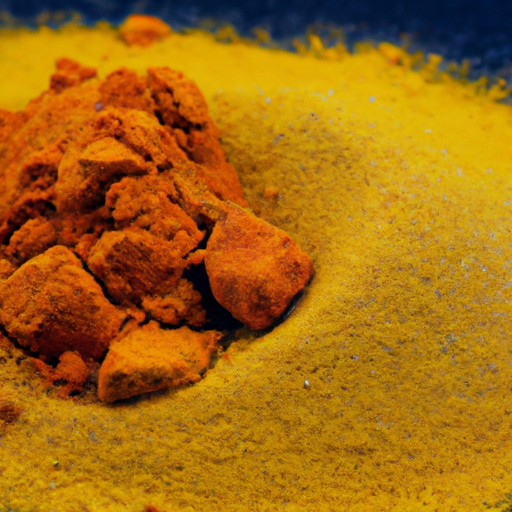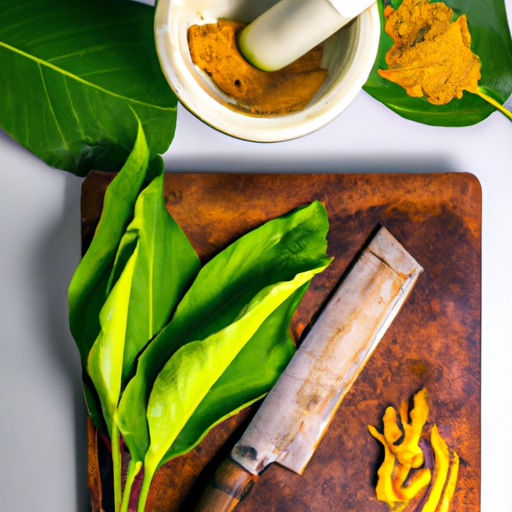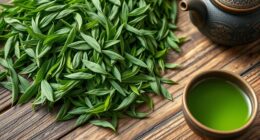Imagine a warm, soothing beverage that not only satisfies your taste buds but also has the potential to ease inflammation in your body. Enter turmeric tea, a golden elixir that has been cherished for centuries for its healing properties.
But how much curcumin, the active compound responsible for its anti-inflammatory effects, does turmeric tea actually contain? In this article, we will explore the curcumin content in turmeric tea and its potential benefits for inflammation. By understanding the recommended amount of turmeric tea for inflammation and other ways to incorporate curcumin into your diet, you can harness the power of this incredible spice to support your overall well-being.
However, it’s important to be aware of potential side effects and precautions associated with curcumin consumption. So, let’s delve into the world of curcumin and discover how turmeric tea can be a delicious and effective addition to your anti-inflammatory arsenal.
Key Takeaways
- Curcumin is an active compound in turmeric tea that has anti-inflammatory effects.
- The dosage of curcumin for inflammation should be determined by a healthcare professional.
- Factors such as turmeric variety, quality, and extraction method can affect curcumin content.
- Consuming turmeric with black pepper or a source of fat can enhance curcumin absorption.
The Benefits of Curcumin for Inflammation
Curcumin, a compound found in turmeric, is renowned for its anti-inflammatory properties. Numerous studies have demonstrated the benefits of curcumin in reducing inflammation in the body. It has been shown to inhibit the production of inflammatory molecules and enzymes, which play a role in various chronic diseases. Additionally, curcumin has been found to modulate the immune system, further reducing inflammation.
The dosage of curcumin for inflammation varies depending on the individual and the condition being treated. While there’s no established standard dosage, studies have used dosages ranging from 500 to 2000 mg per day. It’s important to consult with a healthcare professional to determine the appropriate dosage for your specific needs.
Moving on to the curcumin content in turmeric…
Curcumin Content in Turmeric
When it comes to curcumin content in turmeric, there are two important factors to consider: how curcumin is extracted from the turmeric root and the factors that can affect the curcumin content in turmeric.
Curcumin is typically extracted from turmeric using solvents like ethanol or acetone, and then further processed to obtain a concentrated form. However, the extraction process can vary, and different methods may yield different levels of curcumin.
Additionally, factors such as the variety of turmeric, the age of the plant, and the growing conditions can all influence the curcumin content in turmeric.
How Curcumin is Extracted from Turmeric
Extracting curcumin from turmeric is an intricate process that involves using solvents to separate the valuable compound from the plant’s natural components. This process is necessary to harness the potential health benefits of turmeric, as curcumin is the active ingredient responsible for its anti-inflammatory properties.
Curcumin supplements are widely available in the market due to their potential therapeutic effects. However, the extraction process is essential to obtain a concentrated form of curcumin that can be easily consumed. Factors such as the quality of the turmeric, the extraction method used, and the presence of other compounds in the plant can affect the curcumin content.
Understanding these factors is crucial in determining the curcumin levels in turmeric and optimizing its potential benefits. Moving forward, we will explore the various factors that can influence the curcumin content in turmeric.
Factors Affecting Curcumin Content in Turmeric
To get the most out of your turmeric, it’s important to consider various factors that can impact the amount of curcumin present. These factors include the quality of the spice, the extraction method used, and the presence of other compounds.
The quality of the turmeric spice plays a crucial role in determining the curcumin content. Fresher and higher quality turmeric tends to have higher levels of curcumin.
The extraction method used can also affect curcumin content. Some methods are more effective at extracting curcumin than others.
Furthermore, the presence of other compounds, such as piperine found in black pepper, can enhance curcumin absorption.
Understanding these factors can help optimize curcumin’s role in cancer prevention and overall health.
Moving on to curcumin content in turmeric tea, it is important to consider the brewing process and other factors that can impact the curcumin levels.
Curcumin Content in Turmeric Tea
There’s a significant amount of curcumin in turmeric tea, which makes it a great choice for reducing inflammation. Curcumin absorption and bioavailability are important factors to consider when consuming turmeric for its anti-inflammatory effects.
To ensure maximum absorption, it’s recommended to consume turmeric with black pepper or a source of fat, as these can enhance curcumin absorption. Additionally, heat can also increase the bioavailability of curcumin, making turmeric tea an ideal option.
The combination of these factors allows for better absorption of curcumin and its potential anti-inflammatory benefits. When considering the recommended amount of turmeric tea for inflammation, it’s important to consult with a healthcare professional who can provide personalized guidance based on individual needs.
Recommended Amount of Turmeric Tea for Inflammation
For optimal results in reducing inflammation, you’ll want to incorporate a comforting cup of turmeric tea into your daily routine. Turmeric tea contains curcumin, a compound known for its anti-inflammatory properties. The recommended dosage of turmeric tea for inflammation varies depending on the individual’s needs and health condition. It is generally recommended to consume 1-2 cups of turmeric tea per day. However, it is important to note that curcumin can interact with certain medications, such as blood thinners, and may cause side effects in some individuals. It is always best to consult with a healthcare professional before starting any new herbal remedy. In the next section, we will discuss other ways to incorporate curcumin into your diet without any potential interactions.
Other Ways to Incorporate Curcumin in Your Diet
Try adding a sprinkle of vibrant golden spice to your favorite savory dishes for a flavorful and visually appealing boost to your meals. Curcumin, the active compound in turmeric, offers numerous health benefits and can be easily incorporated into your diet.
Here are a few ways to enjoy the benefits of curcumin:
- Try adding turmeric to roasted vegetables or stir-fries for an extra kick of flavor.
- Make a delicious curry using turmeric, ginger, and garlic for a flavorful and nutritious meal.
- Enjoy a refreshing turmeric smoothie by blending it with fruits like pineapple and mango.
Curcumin supplements are also available and can provide additional health benefits. However, it’s important to consult with a healthcare professional before starting any new supplements.
Now let’s explore the potential side effects and precautions associated with curcumin consumption.
Potential Side Effects and Precautions
Incorporating curcumin into your diet can have numerous health benefits, but it is important to be aware of potential side effects and take necessary precautions. While curcumin is generally safe for consumption, it is recommended to adhere to dosage recommendations and avoid long-term use without medical supervision. Interactions with certain medications and contraindications may also exist, so it is important to consult with a healthcare professional before adding curcumin to your routine. Safety concerns, such as potential allergic reactions and stomach upset, should also be taken into consideration. To help you visualize the potential side effects and precautions, I have created a table below:
| Potential Side Effects | Precautions |
|---|---|
| Allergic Reactions | Consult a healthcare professional if you have a known allergy to turmeric or curcumin |
| Stomach Upset | Start with a lower dosage and gradually increase to assess tolerance |
| Interactions with Medications | Discuss with your healthcare provider if you are taking any medications or have underlying health conditions |
| Long-Term Use | Consult with a healthcare professional for guidance on duration and monitoring of use |
By being aware of these potential side effects and taking necessary precautions, you can safely harness the power of curcumin for inflammation. Let’s now move on to the conclusion: harnessing the power of curcumin for inflammation.
Conclusion: Harnessing the Power of Curcumin for Inflammation
To fully harness the incredible power of curcumin in reducing inflammation, you’re now equipped with the knowledge and precautions necessary to safely add this potent ingredient to your wellness routine. Curcumin has shown great potential for pain relief and plays a significant role in managing chronic inflammation. Here are three reasons why curcumin is worth incorporating into your anti-inflammatory regimen:
-
Curcumin’s anti-inflammatory properties: Numerous studies have demonstrated curcumin’s ability to reduce inflammation by targeting multiple inflammatory pathways in the body. It inhibits the production of inflammatory molecules and prevents the activation of inflammatory genes.
-
Curcumin has antioxidant effects: Chronic inflammation can lead to oxidative stress, which damages cells and tissues. Curcumin acts as a powerful antioxidant, neutralizing harmful free radicals and protecting against oxidative damage.
-
Curcumin can modulate the immune system: Curcumin has been found to regulate immune system responses, helping to balance the immune system’s activity and prevent excessive inflammation.
By incorporating curcumin into your routine, you can harness its potential for pain relief and effectively manage chronic inflammation.
Frequently Asked Questions
Can I consume turmeric tea if I have allergies to curcumin?
Yes, you can consume turmeric tea even if you have allergies to curcumin. While curcumin is the active compound in turmeric, the tea contains other beneficial compounds that can provide anti-inflammatory benefits.
How long does it take for turmeric tea to provide relief from inflammation?
Turmeric tea can provide relief from inflammation within a few weeks of regular consumption. Its dosage for inflammation varies, but the benefits of turmeric tea on overall health make it a valuable addition to one’s wellness routine.
Is it safe to consume turmeric tea while taking certain medications?
While turmeric tea can be a soothing elixir, it’s crucial to consider its impact on liver function and potential interactions with anti-inflammatory meds. It’s best to consult a healthcare professional for personalized advice.
Can I use ground turmeric instead of fresh turmeric root to make turmeric tea?
Yes, ground turmeric can be used instead of fresh turmeric root to make turmeric tea. It is a convenient option for cooking with turmeric and still provides the same benefits of turmeric tea.
Are there any specific times of the day when it is most beneficial to drink turmeric tea for inflammation?
The best time to drink turmeric tea for inflammation is in the morning or evening. Consuming it at these times can provide the most benefits, such as reducing inflammation and promoting overall health.
Conclusion
In conclusion, the power of curcumin in fighting inflammation is truly remarkable. Like a golden ray of sunshine, curcumin shines brightly in its ability to reduce pain and swelling. Incorporating turmeric tea into your daily routine can provide you with a delicious and effective way to harness the benefits of curcumin. Remember to consume the recommended amount of turmeric tea to experience its full potential.
Additionally, exploring other culinary avenues to introduce curcumin into your diet can further enhance its anti-inflammatory effects. However, it’s crucial to be aware of potential side effects and take necessary precautions. So, embrace the healing power of curcumin and let it guide you towards a healthier, inflammation-free life.










